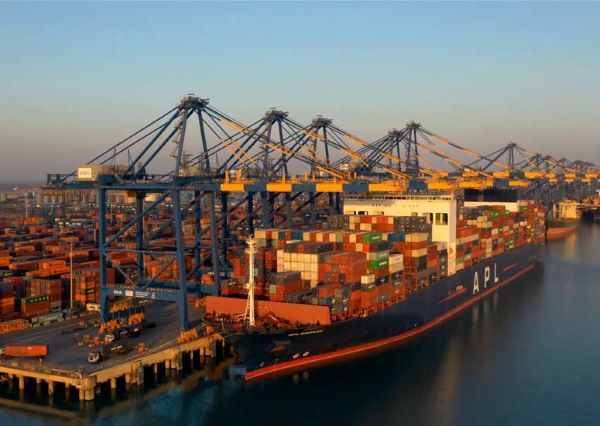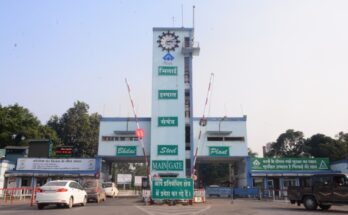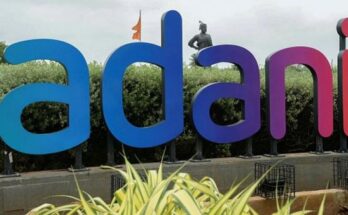
Team News Riveting
Ahmedabad, November 3
Adani Ports and Special Economic Zone Ltd (APSEZ), the largest integrated transport utility in India and a part of the diversified Adani Group, handled 37 MMT of total cargo in October 2023, implying a year-on-year (Y-o-Y) growth of 48 per cent.
For the first time in the company’s history, the total cargo volume of company’s portfolio of ports in India surpassed the 35-MMT mark to touch 36 MMT, which is a good 43 per cent Y-o-Y growth. The Haifa Port in Israel handled over 1.1 MMT of cargo in October, marginally better than the average cargo volume run rate of the last six months. Overall, in the initial seven months of FY24 (Apr – Oct’ 2023), APSEZ has handled 240 MMT of total cargo, which is a good 18 per cent Y-o-Y growth. Across its ports in India, the recorded volume growth on Y-o-Y basis is around 15 per cent.
“The improvement in cargo volumes is testimony to the success of three prong business strategy with encompasses the focus on – higher operational efficiencies, integrated business model with an end-to-end service to our customers, and our long-term strategic partnership model with our stakeholders, including customers” said Karan Adani, CEO and Whole Time Director, APSEZ “. It shows commitment to using improved efficiencies and technological integrations to drive new benchmarks and achieve customer satisfaction, he added.
During the initial seven months of FY24 (Apr-Oct’ 23), the three broad cargo types – dry bulk, liquids, and containers – have recorded a double-digit YoY growth. The total containers handled by APSEZ in India increased to 5.5 MTEUs (+13 per cent YoY), including 4.2 MTEUs at Mundra alone. The Dry Bulk Cargo volumes have seen an increase of 14 per cent, with this growth primarily driven by iron ore (+260 per cent) and coal volumes (+13 per cent). The jump in the Liquids and Gas volumes has been around 20 per cent.
APSEZ consistently works on cargo diversification at all its ports, by adding new cargo types across its ports. During the period under consideration, Dhamra Port has added LNG to its product portfolio, Mudra Port handled soda ash for the first time, Tuna Port added limestone and iron ore, Dahej Port successfully included Copper concentrate and pet coke to its cargo portfolio, while Hazira Port recorded iron ore fines and steel rails for the first time, with Dighi Port adding rock phosphate, and Krishnapatnam Port received its first vessel of pyroxenite.
The logistics business segment has also delivered record performance, with 24 per cent Y-o-Y growth in rail TEU’s, there taking the total container volumes handled in the initial seven months to ~328,000 TEUs and 43 per cent Y-o-Y growth in bulk cargo volumes with handling of ~10.6 MMTs of cargo. With around 95 per cent of the India’s trade volumes carried through maritime transport, increase in cargo volume at ports reflects country’s economic prosperity. Therefore, having world-class mega ports is imperative for the Indian coastline.
APSEZ has strategically built a string of ports across the Indian coastline along with Inland Container Depots (ICDs) and warehouses, woven intricately with self-owned rakes, covering around 90 per cent of the country’s hinterland. The capability to maintain deep draft ports is enabling APSEZ’s customers to bring larger vessel parcels, thereby lowering their overall logistics cost. The lower logistics costs allow businesses to export goods, boosting domestic economy and raising the employment rate in the country.
In the initial seven months of FY24, APSEZ has already docked ~5,700 ships and serviced 27,300 rakes, including some of the largest ships ever handled by the respective port. In the period under consideration, Mundra Port successfully berthed MV MSC Hamburg, 399 meters long and 54 meters wide vessel, having a carrying capacity of 15,908 TEUs. The port also surpassed its previous record by handling an over-dimensional container/s (ODCs) on a single vessel, M/V CMA CGM Figaro, with 114 units (219 TEUs).
Among India’s ports that can handle cape-size vessels with deeper drafts, Krishnapatnam Port berthed its largest vessel having dimensions of LOA – 335.94 meters and Beam – 42.94 meters. The Dhamra Port, where a new LNG facility has been commissioned in a JV with TOTAL Group, berthed its first LNG-powered cape-sized vessel, MV UBUNTU UNITY. Another port from APSEZ’s portfolio. Kattupalli Port berthed the MV Seaspan Beacon with 10,000 TEUs, surpassing its previous record of handling 8,600 TEUs in a ship. The port also berthed a container vessel with a draft of 14.5m and displacement of 1,28,046 T, surpassing its previous record of 1,21,958 T.
The observed growth from Apr-Oct’ 23 has been contributed by most of the ports in the portfolio. Our flagship port, Mundra, achieved another milestone of handling 16 MMT of cargo in a month, a benchmark for the Indian ports. On YTD basis, Mundra has reported cargo volumes of 102 MMT, which is a good 9 per cent Y-o-Y growth. Busy traffic has also been witnessed at our other key ports as well. APSEZ’s sole port in Orissa, Dhamra, observed 19 per cent Y-o-Y growth on the back of pickup in the iron ore exports from India. Similarly, Gangavaram Port, for which we completed the acquisition in FY23, saw its cargo volumes
grow at 13 per cent Y-o-Y in the initial seven months. Two of company’s terminals, Tuna & Ennore, recorded Y-o-Y cargo growth of 23 per cent and 14 per cent respectively.
APSEZ’s achievement underlines its ability to adapt to fast-paced changes due to global market and geopolitical volatility and continue its journey towards sustainable growth. Improved port infrastructure means better logistics performance and higher seaborne trade and economic growth, key to India becoming a $5 trillion economy.



